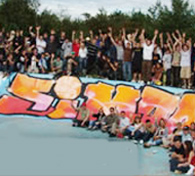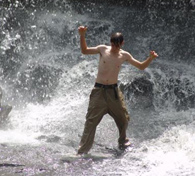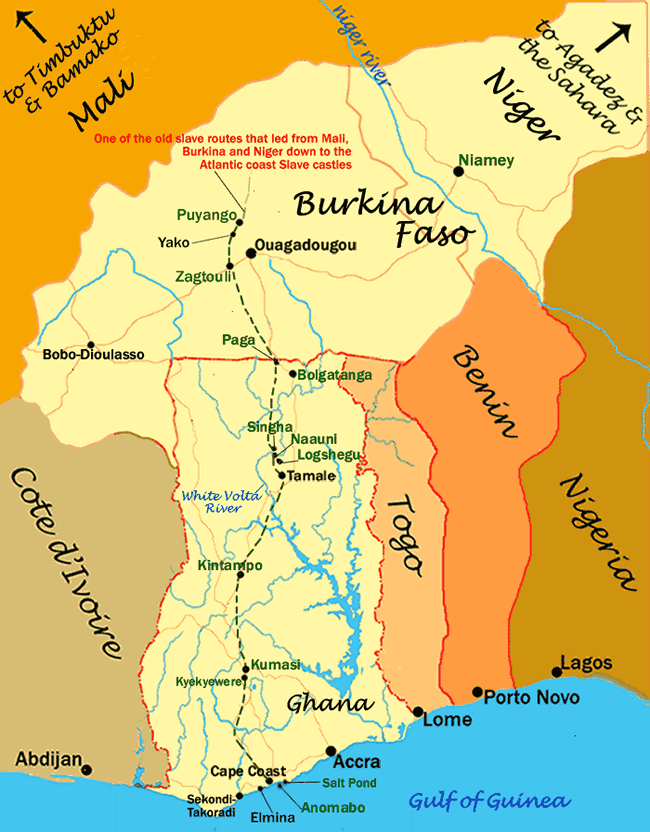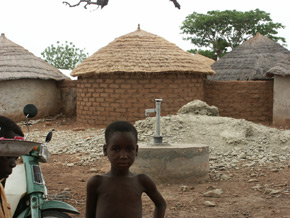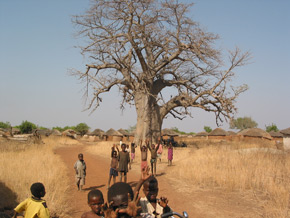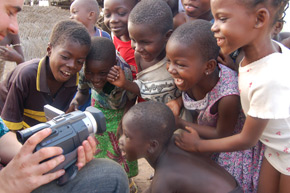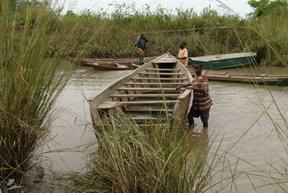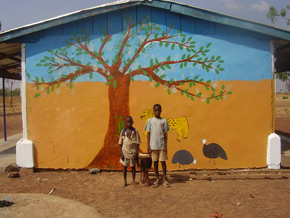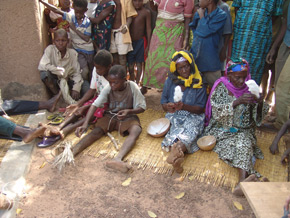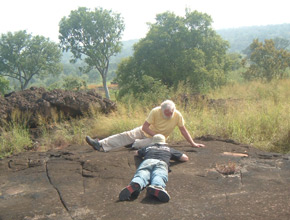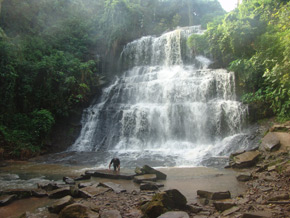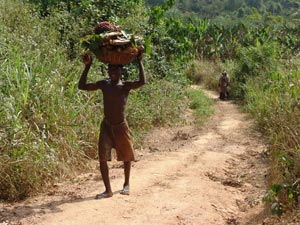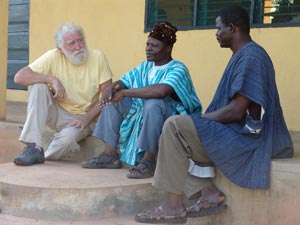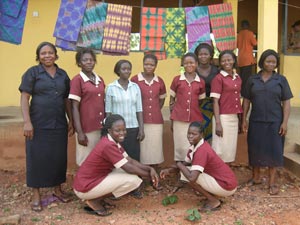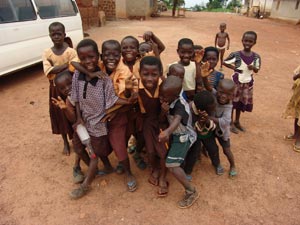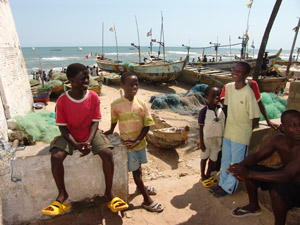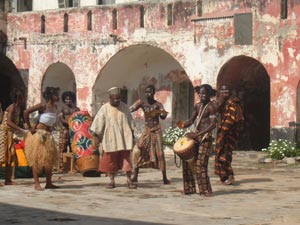Simons Projects
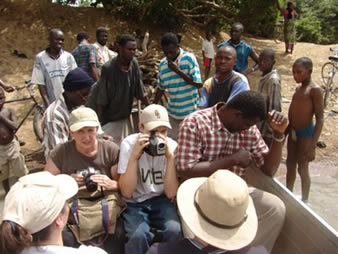 Simon worked with his father David, for The And Albert Foundation, a registered charity (no. 1072068) based in Beverley, East Yorkshire set up to create long term ethical trade with villages in the developing world. The charity is also involved in community healthcare, sustainable development and fresh water well projects. Simon visited the project sites in January 2005 and was touched by what he experienced, pledging to help make a difference upon his return. Together with his colleagues he travelled extensively, from Accra in the South of Ghana into the remote Northern villages and then onto Ouagadougou and Zagtouli in Burkina Faso. Since his untimely death, in March 2005, many of Simon's friends and family have become involved in supporting the work in West Africa that Simon was so passionate about.
Simon worked with his father David, for The And Albert Foundation, a registered charity (no. 1072068) based in Beverley, East Yorkshire set up to create long term ethical trade with villages in the developing world. The charity is also involved in community healthcare, sustainable development and fresh water well projects. Simon visited the project sites in January 2005 and was touched by what he experienced, pledging to help make a difference upon his return. Together with his colleagues he travelled extensively, from Accra in the South of Ghana into the remote Northern villages and then onto Ouagadougou and Zagtouli in Burkina Faso. Since his untimely death, in March 2005, many of Simon's friends and family have become involved in supporting the work in West Africa that Simon was so passionate about.
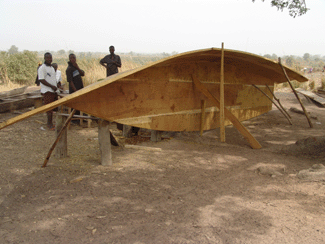 Singha village in the dry season, the last village on the old slave track from the North before the White Volta river. Our strategies to help now and in the future include clean water, education healthcare, building a ferry to the nearest village across the Volta, Nawuni, opening trading roots up and down the river (there are over 100 villages in both directions within 70 miles), providing and equipping a mobile clinicinto this remote area - average income, less than $1 Per Week! Simon's main aim on returning from Africa was to earn enough to put in a clean water borehole and pump. The collection at his funeral came to £1800 (Half the cost). With further donations since the funeral we raised £3200 towards the total cost of £3800, the full ammount of which has now been sent out to complete the job.
Singha village in the dry season, the last village on the old slave track from the North before the White Volta river. Our strategies to help now and in the future include clean water, education healthcare, building a ferry to the nearest village across the Volta, Nawuni, opening trading roots up and down the river (there are over 100 villages in both directions within 70 miles), providing and equipping a mobile clinicinto this remote area - average income, less than $1 Per Week! Simon's main aim on returning from Africa was to earn enough to put in a clean water borehole and pump. The collection at his funeral came to £1800 (Half the cost). With further donations since the funeral we raised £3200 towards the total cost of £3800, the full ammount of which has now been sent out to complete the job.
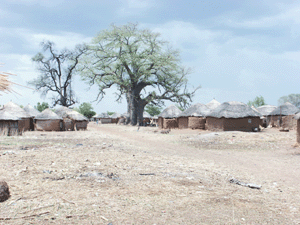 Any project we undertake depends on growing, long term relationships which engender trust and long term solutions to a complex network of problems. The generation of ideas we hope will lead to self sufficiency are nottherefore based on a Western "charity" or "aid" model. It was the sparking of ideas from these relationships which Simon saw as the way forward for all ourfutures. All monies generated will be spent wisely with ongoing evidence to illustrate this long term developmental model.
Any project we undertake depends on growing, long term relationships which engender trust and long term solutions to a complex network of problems. The generation of ideas we hope will lead to self sufficiency are nottherefore based on a Western "charity" or "aid" model. It was the sparking of ideas from these relationships which Simon saw as the way forward for all ourfutures. All monies generated will be spent wisely with ongoing evidence to illustrate this long term developmental model.
Pictures : Top-Left: Simon and colleagues crossing the White Volta river to Singa
Top-Right: Ferry building in Naauni on the banks of the White Volta river
Left: Singa village with it's majestic baobab tree
Project Donations from fundraising by Simon's Family and Friends have contributed towards:
- Fresh Water wells built in Kumasi, Kyekyewere, Zagtouli, Puyango, Singha giving hundreds of people access to clean drinking water, and avoiding medical problems such as river blindness and guinea worm.
- School Uniforms been purchased, giving children the chance to gain an education that they otherwise might not have.
- The construction of a ferry to traverse the White Volta, giving access to inter village trade along the Volta and in the future, a vehicle that will take medical relief landrovers and mobile clinics across the river to the remote villages beyond.
- The cost of a container of recycled western throw-away society goods, such as sewing machines, pens and paper, computers, tools, medical equipment...and more, shortly to be sent out to Ghana and Burkina Faso giving people access to useful tools for educational and/or small macroenterprise workshop development.
- Helped to rejuvenate and redecorate the village school at Logshegu in North Ghana, giving the children a more friendlier and fun environment for their schooling.
- For other articles relating the Projects in West Africa and what's been achieved, see the Archive section
- To see some pictures of Simons time in Africa, see here
How you can help
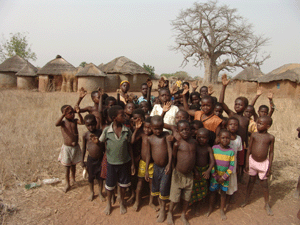 Guaranteed Principle : The Foundation works on the principle of ALL donated monies going directly to help the village projects amongst the very poorest and most vulnerable people. There is nothing deducted for administrative expenses. Trading Roots sales, both wholesale and retail, allow sufficient profit to cover all Foundation expenses and also return a further significant percentage back to the grass-roots development projects.
Guaranteed Principle : The Foundation works on the principle of ALL donated monies going directly to help the village projects amongst the very poorest and most vulnerable people. There is nothing deducted for administrative expenses. Trading Roots sales, both wholesale and retail, allow sufficient profit to cover all Foundation expenses and also return a further significant percentage back to the grass-roots development projects.
This model works in practice - you are welcome to come and look! If you would like to get involved in And Albert Foundation, help the Projects in any way, suggest ideas for new Projects, make a donation or just find out what inspired Simon so much about the work in West Africa, see their website here.
Project Map
Follow one of the old slave trade routes down from Mali to Burkina Faso to Ghana and click on the green links on the map below to find out more about each of our project locations and what's going on where, or alternatively scroll down the page to read all about it!
Niamey, Niger
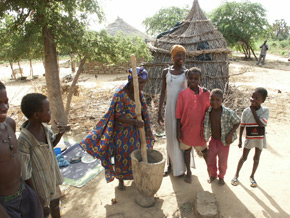
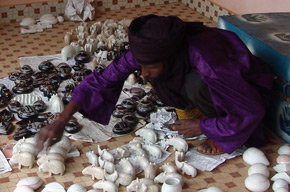
left: Everyday life in a village near Niamey | right: Mohammed Ahnou, our Touareg representative and his soapstone wares!
Capital of Niger, the Sahara desert region where we have traded since 1993 mostly in Touareg and Fulani crafts but now wish to create Trading Post and guest house facilities near Niamey and Agadez and have appointed a Touareg representative, Mohammed Ahnou, to oversight more trading and further work in 2009, including the planting of fruit trees and their subsequent nurturing. He will be joined by Lagouet Lagouet, the Imam and 'the bird man of Niamey', another long standing friend with whom we have traded with in the area for many years.
Back to map
Pougyango, Burkina Faso
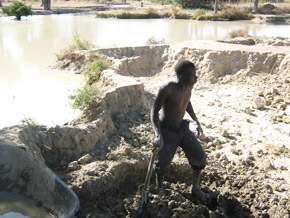
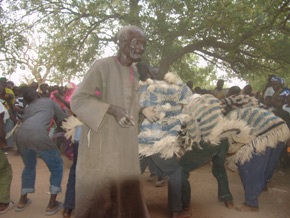
left: Digging the clay for mud bricks to create our guest house | right: Village elders join in the dance at a local festival
North Burkinabe poor village where we are bringing clean water, farming and craft skills resources to the local community via our base in Ouaga. The birthplace of our Burkinabe Trustee, Jonas Kinda. The previously dug out well in the village has been renovated and another completed so far, and plans for a further two are well underway, as are plans to assist in the upgrading and part rebuilding of the local school. Guest house facilities and a plan to help local orphans has begun this year.
Back to map
Zagtouli, Burkina Faso
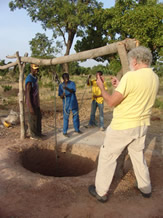
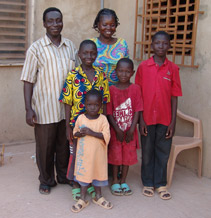
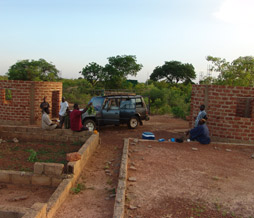
left: David Bellamy at the village well constuction site| middle: Our Burkinabe Trustee Jonas and his family, who will oversight the works at Zagtouli | right: Trading post, Offices and Gust Houses under construction at Zagtouli
Village near Ouagadougou, our Offices, Trading Post and Guest Centre for the Sahel and Burkina Faso which will be oversighted by our Burkinabe Trustee Jonas. Facilities for craft reception, small scale farming, skills training, heritage education and eco-tourism. A bore hole well has been completed here giving the area access to clean drinking water for the first time. The picture above on the left shows Professor David Bellamy in November 2005 with the construction team blasting out the rocks from the borehole, just prior to completion. It has since been fitted with a pump and is now fully functional and being used by surrounding villages.
Back to map
Paga, Ghana
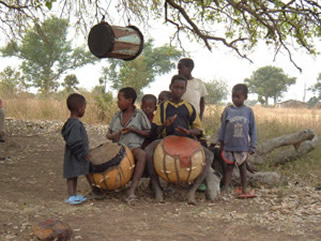
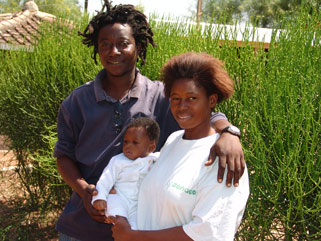
left: Children in one of the villages around Paga expressing their musical heritage | right: our representative in Paga, Steven and his family
Port of exit from Ghana when en route to Burkina Faso. Home of many friends and supporters. A Trading Post and eco-tourist guest houses are planned on land in one of the nearby village areas which will also encompass Mango and other fruit bearing tree plantations.
Back to map
Bolgatanga, Ghana
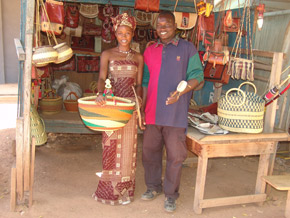
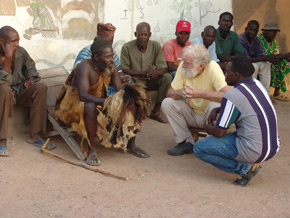
left: Dominic, our Fra Fra Trustee along with Lisa, one our Representatives from Bolgatanga | right: David Bellamy meeting Dominic's father in their nearby village, Nov 2005
Centre of the basket making project, and major town on the road north towards the border and Burkina Faso. Tea and Coffee shop Trading Post and soon to be village Culture and Education centre nearby for the Fra Fra Heritage of fine music, song and dance. We work with workshops in over 25 villages producing millet straw baskets, coordinated by Dominic Agongo, our Fra Fra Trustee in Ghana. The Trading Post land is a prime site for the introduction of new varieties of fruit trees as well as the encouragement and increase of the existing ones that are there already, and the surrounding villages will benefit greatly with the introduction of fruit drinks for the children.






